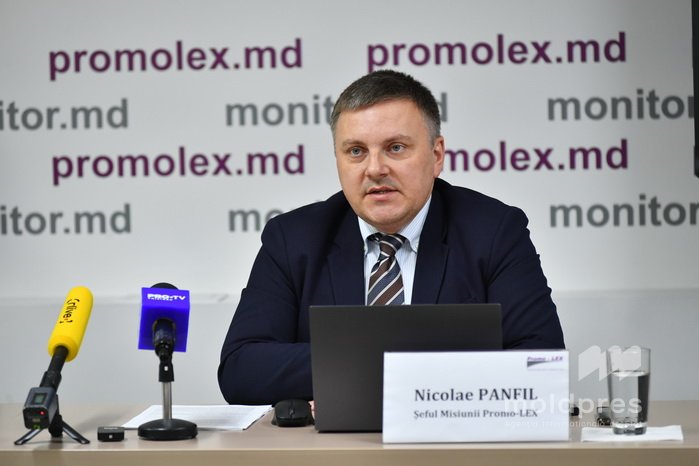
Promo-LEX report for electoral period
Promo-LEX Association highlights 'external interferences, especially from the Russian Federation,' actions manifested during the electoral period through 'voter bribery, illegal campaign financing, informational manipulation, organizing paid protests and cyberattacks.' These conclusions are included in Report No. 2 of the election observation mission for the parliamentary elections on September 28.
During a press conference, the head of the Promo-LEX mission, Nicolae Panfil, noted the involvement of Ilan Șor in amplifying tensions regarding electoral processes and disinformation campaigns.
'The social-political situation was further marked by events impacting the security and integrity of the organization and conduct of the elections. These fall under the list of threats concerning the danger of external interference in the electoral processes in the Republic of Moldova. The source of these interferences still seems to be the Russian Federation, through the involvement of Ilan Shor, the former president of the Shor party, declared unconstitutional. Simultaneously, ideas about election fraud through the diaspora continued to be promoted. The source of these narratives was the Russian Federation through persistent disinformation attacks. Additionally, cyberattacks on the country's critical infrastructure were observed,' said Nicolae Panfil.
At the same time, the head of the observation mission highlighted the increase in the number of polling stations opened for the parliamentary elections compared to the presidential election last fall. Also, concerns were raised about the voting process in the sections in the Russian Federation.
'The electoral district councils established 1,961 polling stations in the territory of the Republic of Moldova, 301 abroad, and 12 for the left bank of the Dniester. Regarding the increase in the number of polling stations by about 70 units compared to the last election, the observation mission supports efforts to make voting abroad more accessible. Concerning the Russian Federation, the association considers that, in addition to threats to citizens' security, there are vulnerabilities regarding the integrity of the electoral process. Thus, we indicated in previous reports, including during last year's presidential elections and referendum, that attempts to buy voters' votes at or near polling stations in Russia were found, as well as their organized transportation. Therefore, we understand the authorities' concerns. Regarding voting by correspondence, the authorities increased the number of states from six to ten, having created four polling stations where ballots will be collected. Statistically, compared to 2024, the number of mail voting applications increased from 1,986 to 2,606, and in this context, we highlight that a heightened interest in mail voting was manifested in countries where the mechanism is now being implemented again,' explained Nicolae Panfil.
The Head of the Promo-LEX Mission also referred to the organization of polling stations for voters from the left bank of the Dniester.
'The organization of polling stations for citizens from the left bank of the Dniester should be treated in a broader context of the need to democratize and reintegrate the uncontrolled region. We consider that the current geopolitical conjuncture should be used by the constitutional authorities to compel the so-called authorities of Tiraspol to accept certain conditions which, in perspective, would ensure conditions for democratizing the Transnistrian region. The efforts of the authorities in Chișinău, from the perspective of integrating voters from the region in national electoral processes, should focus on guaranteeing access for national media in the region. We refer here to the physical access of journalists and electoral competitors to conduct electoral campaigns, as well as of observers. These efforts will substantially contribute to preventing and counteracting attempts to undermine the correctness of the electoral process,' added Nicolae Panfil.
Dina Boțan, an analytics specialist highlighted the increase in the number of observers accredited by the Central Electoral Commission for the parliamentary election.
'In total, to monitor the elections, the electoral authority accredited 1,325 observers from 12 national and foreign institutions. 1,249 of them are national observers and 76 are international observers and experts. It is very important that they have free access in monitoring the electoral processes,' noted Dina Boțan.
The report contains findings from the period July 22 – August 27. Thus, the document highlights the main trends during the electoral period, the activities of potential electoral competitors, and the risks that may affect the correctness and transparency of the election.
On September 28, the citizens of the Republic of Moldova with the right to vote are expected to go to the polls to elect deputies in the future Parliament.
DOC // Inmates to no longer be able to use mobile phones, internet in unauthorized way; regulation on blocking radio communications in penitentiaries published in Official Journal of Moldova
Real estate assets of MP Irina Lozovan seized; decision published in Official Journal of Moldova
Three independent candidates start electoral campaign parliamentary elections due in Moldova
Our Party of Moldova starts electoral campaign
Extraordinary Chinese music concert, dedicated to China's National Day, held at Chisinau-based Organ Hall
Action and Solidarity Party launched electoral campaign for 28 September parliamentary elections
Authorities report new fake on president "plans to send over 700 volunteers to Ukraine"
CEC rejected application to register PDMM's candidate list for parliamentary elections
Promo-LEX report for electoral period
On Romanian Language Day, Moldovan President hosts Romanian President in Chișinău
Leaders of Alternative Bloc of Moldova present electoral programme, delivered common message
PHOTO GALLERY // Moldova Salons invite visitors to discover contemporary art
Moldovan president has phone conversation with Polish head of state
Internal Protection and Anti-corruption Service of Ministry of Internal Affairs equipped with EU-supported modern drones for special missions
Latvia sets up new entry regulations for citizens without visa or residence permit
Moldovan parliament convenes for autumn session


